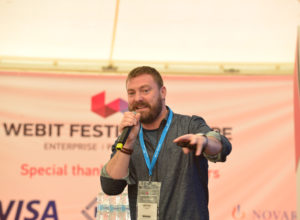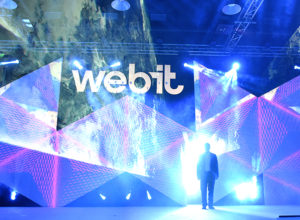Tag: chris clarke
How the Internet took away our ability to understand the world...
Over the past few decades the art of marketing has developed in an increasingly globalized world - a trend, that was only accelerated by the emergence of internet and digital technology. During that period of time we had almost a global liberal consensus, both politically and socially, about the path our world must take. But right now it looks like this world order is on its way to an inevitable collapse and this is something that leads to a massive change the way the companies are approaching consumers.
A lot of the brands that we know today took over in the last 25 years and were built on the basis of a global and unified world. In the reality now this is no longer true, because we realized that this concept can’t hold. There are people and constituencies around the world who had been left behind by globalization, who haven’t received benefits as much as other groups. And as a result of that we have the rise of populism. It has given us Trump in the USA, it has given us Brexit in the UK and perhaps even more horribly the phenomenon of grabbing power in Turkey.
During the recent Webit.Festival Europe we had the chance to hear these trends explained by the Chief Creative Officer of DigitasLBi Chris Clarke. During his presentation he talked about the death of empathy in the information age and shared his vision on the changes that needs to be made in order to protect our society from the dark and unintended consequences of the idea of free information.
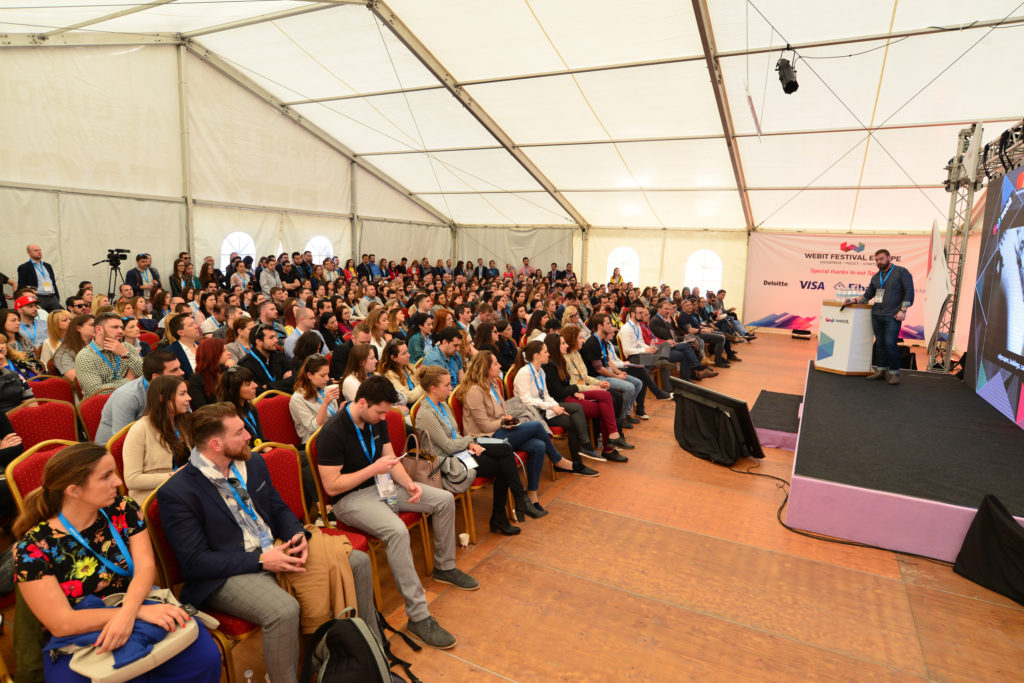 The Chief Creative Officer of DigitasLBi Chris Clarke[/caption]
Back in 2012 when Instagram was bought by Facebook for a $1 billion was the year when Kodak went bust. In its peak Kodak employed 300 000 people around the world and it made revenues of $3-4 billion a year. When Instagram was bought for a billion Instagram had 30 employees and made revenues of $0. So there are some major challenges in terms of value destruction, as well as value creation when it comes to digital disruption.
As someone who describes himself as a cheerful dystopian, he warned that marketers must think about the impact of their works when advising brands about the brightest ways to operate in this space. Because the development of internet did not give control to the consumers - it took it away from them.
Today we are checking our phones regularly even when we should be playing with our children. The reason for this is the addiction we develop, because of the dopamine reward that the usage of different platforms is giving us.Clarke describes the social media and global businesses like Google and Facebook as the best system of population control ever invented.
The Chief Creative Officer of DigitasLBi Chris Clarke[/caption]
Back in 2012 when Instagram was bought by Facebook for a $1 billion was the year when Kodak went bust. In its peak Kodak employed 300 000 people around the world and it made revenues of $3-4 billion a year. When Instagram was bought for a billion Instagram had 30 employees and made revenues of $0. So there are some major challenges in terms of value destruction, as well as value creation when it comes to digital disruption.
As someone who describes himself as a cheerful dystopian, he warned that marketers must think about the impact of their works when advising brands about the brightest ways to operate in this space. Because the development of internet did not give control to the consumers - it took it away from them.
Today we are checking our phones regularly even when we should be playing with our children. The reason for this is the addiction we develop, because of the dopamine reward that the usage of different platforms is giving us.Clarke describes the social media and global businesses like Google and Facebook as the best system of population control ever invented.
“We are experiencing great social changes and they are completely changing the way brands need to communicate. Only 17 years ago the most powerful computer in the world was called the Big Red and was about the size of a room. Six years later the same processing power was available in the Sony PlayStation 3 and now it is available in the smartphones in our pockets”, he said.According to Clarke now it is almost impossible for any person or organization to really know what is happening in the world. The pace of change is very fast that it is almost impossible for governments and legislation to keep up. We have a growth of massive digital businesses that have disrupted whole industries and this comes with a big prize that someone has to pay. When The Cluetrain Manifesto, often regarded as the Bible for digital disruption, was released in 2009 we all took for granted the notion that information wants to be free and the idea of free content online. Now we can see that while the industrial disruption can create great opportunities, the problem is that the disrupted industries have not really been replaced in terms of jobs. We have the challenge that economists describe as “premature deindustrialization”. A developing country, like India for example, is trying hard to get the people out of the fields and put them into factories. But now the factories are operated by machines and apps, so they have to get people out of the fields and put them into educational institutions to teach them about software development, which is much bigger leap. That caused huge challenges and countries are struggling to keep up. [caption id="attachment_5006" align="aligncenter" width="640"]
 The Chief Creative Officer of DigitasLBi Chris Clarke[/caption]
Back in 2012 when Instagram was bought by Facebook for a $1 billion was the year when Kodak went bust. In its peak Kodak employed 300 000 people around the world and it made revenues of $3-4 billion a year. When Instagram was bought for a billion Instagram had 30 employees and made revenues of $0. So there are some major challenges in terms of value destruction, as well as value creation when it comes to digital disruption.
As someone who describes himself as a cheerful dystopian, he warned that marketers must think about the impact of their works when advising brands about the brightest ways to operate in this space. Because the development of internet did not give control to the consumers - it took it away from them.
Today we are checking our phones regularly even when we should be playing with our children. The reason for this is the addiction we develop, because of the dopamine reward that the usage of different platforms is giving us.Clarke describes the social media and global businesses like Google and Facebook as the best system of population control ever invented.
The Chief Creative Officer of DigitasLBi Chris Clarke[/caption]
Back in 2012 when Instagram was bought by Facebook for a $1 billion was the year when Kodak went bust. In its peak Kodak employed 300 000 people around the world and it made revenues of $3-4 billion a year. When Instagram was bought for a billion Instagram had 30 employees and made revenues of $0. So there are some major challenges in terms of value destruction, as well as value creation when it comes to digital disruption.
As someone who describes himself as a cheerful dystopian, he warned that marketers must think about the impact of their works when advising brands about the brightest ways to operate in this space. Because the development of internet did not give control to the consumers - it took it away from them.
Today we are checking our phones regularly even when we should be playing with our children. The reason for this is the addiction we develop, because of the dopamine reward that the usage of different platforms is giving us.Clarke describes the social media and global businesses like Google and Facebook as the best system of population control ever invented.
“People like to talk about the Arab spring as being a wonderful moment of social media giving start to great rebellion. But it didn’t exactly end up well, did it? Because even as Facebook is quite good for helping us organize ourselves, it’s pretty rubbish when we have to come up with alternative to a theocratic state, like Iran for example. People there are not thinking deeply about their issues, they are liking, passing on information, getting that quick dopamine reward and then moving on”, he said.The fact that most of the platforms we consume information from are tailored for us creates filter bubbles that took away from us the idea of what people, who are not like us, are reading or experiencing. This is why for many people it was surprise that Brexit and Trump happened - because these major world shaking events are forming inside someone else’s bubble. It is therefore impossible for a brand to address everybody with one campaign idea globally. Because each filter bubble is unique. Couple of years ago Google’s Executive Chairman Eric Schmidt predicted that it will be very hard for people to watch or consume something that is not in some sense been tailored for them. But despite this negative trends, Clarke is sure that the massive polarization of audiences gives the big brands a chance to stand up and be the driver behind the positive change in the world. The reason is that it is really difficult to mean something to anybody when you are occupying the middle space that is now disappearing. Right after Donald Trump introduced his Muslim ban in the USA, many brands stood up against this, risking to alienate part of their audiences and saying that money are less important than values. This is something that we did not often see in the past and can be an opportunity to have a real impact in the society.
“I genuinely think that there is a fantastic opportunity if we think in the right way of how the internet is configured, if we question it, if we don’t just pretend that the customer is in control, if we don’t just pretend it is all about democracy and laugh. If we recognize some of the darker sides of what we are building we can change it and make it better. And I think that brands have a fantastic role to play in that”, Chris Clarke said.You may watch his full lecture here: If you want to keep up with the latest trend in the world of digital economy and technology, then Webit.Festival is the right place for you. Visit our website and book 2 of our Super Earlybird tickets for Webit.Festival Europe 2018 for just €100. Feel the Webit vibe with some of the best photos from this year’s event! [easingslider id="4954"]
Take a peek at the future of corporate outlook at Webit.Festival
The world as we know it is collapsing and the change is happening so quick that even intelligent people struggle to understand exactly what is going on around them.
In today’s public environment the whole concept of enterprise image is transforming. And while for the last several decades advertising was considered morally neutral, now we can see that big brands are more and more involved in politics.
If you don’t believe this ascertainment, just take a look at the USA State Department, which is now led by the ex CEO of the biggest oil company in the world (ExxonMobil) Rex Tillerson.
This year, Webit.Festival will address the transformation processes that are shaping the digital enterprises of the future in Europe and the world. The event will be held on 25-26 April in Sofia Tech Park under the patronage of the President of Bulgaria Rumen Radev, the Mayor of Sofia Yordanka Fandakova and the European Commission.
During the Marketing & Innovation Summit you will get the chance to listen to the Chief Creative Officer of DigitasLBi Chris Clarke. He oversees the agency’s creative output internationally, has overall responsibility for DigitasLBi’s point of view on the world, and is the father of the famous unicorn emblem.
Known for his provocative views, Chris is a regular commentator in titles like The Guardian, Marketing and Campaign, and was among the first in this industry to highlight the darker side of digital disruption.
He is a passionate proponent of the idea of enlightened self-interest, and believes that businesses can build their brands by creating work which has a social purpose at its heart - a view which is reflected in DigitasLBi’s initiatives for clients like Durex and AstraZeneca.
On Webit’s stage, Chris will speak about the death of empathy and will explain why global brand consistency doesn’t matter anymore.
He will talk about the emergence of filter bubbles and show how this has impacted politics, culture society and by extension, brands.
Whether we like it or not, this phenomenon means we no longer understand the world outside our own network, so brands must increasingly play a game of channel authenticity over brand consistency.
Here you can see a full list of the confirmed speakers at Webit.Festival, while here you can get all the information you need about the tickets for the event.
Webit.Foundation presents the first three speakers in the Marketing and Innovation...
One of the most recognised brands of Webit.Festival, the Marketing and Innovation Summit, is once again bringing together the top CMOs, CTOs and CIOs from the advertising world, broadcasters, publishers, and ad/media/digital agencies. During the 25th and the 26th of April, Webit.Festival 2017 is the place to be in Europe if you want to hear about the latest trends in marketing, media and how the digital transformation is continuingly changing the whole business world.
We have 3 new top-flight speakers in our lineup for the Marketing and Innovation Summit! They include top executives from huge marketing agencies, so read our guide to taking part or find out more about our latest speaker additions below.
- Jason Jercinovic, Global Brand Director & President of Havas Worldwide.
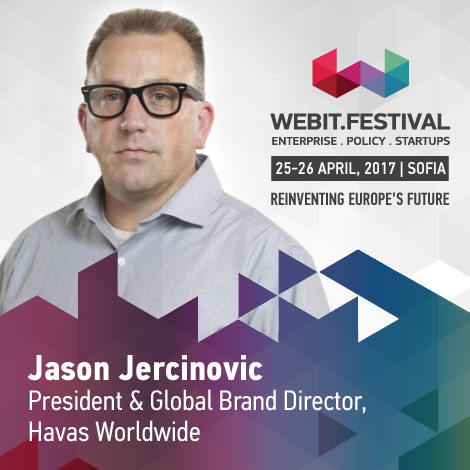 Jason is a digital marketing guru with more than twenty years experience in technology and advertising. He had been working for the campaigns of sports giants like Nike, celebrities like Justin Bieber and Taylor Swift and so on. His previous experience includes heading up the Havas Worldwide in Australia, working on Global accounts at Intel and Dell and for clients like Sony Australia. Jason believes that the future is cognitive and the way we can use cognitive technology and virtual reality for brand development. "No one knows what will happen next. Success will come to those who are more adaptable. Respond to change and opportunity by knowing your user's pain and needs. Cognitive is the competitive advantage enabling partnership between people and computers”, he concludes.
Jason is a digital marketing guru with more than twenty years experience in technology and advertising. He had been working for the campaigns of sports giants like Nike, celebrities like Justin Bieber and Taylor Swift and so on. His previous experience includes heading up the Havas Worldwide in Australia, working on Global accounts at Intel and Dell and for clients like Sony Australia. Jason believes that the future is cognitive and the way we can use cognitive technology and virtual reality for brand development. "No one knows what will happen next. Success will come to those who are more adaptable. Respond to change and opportunity by knowing your user's pain and needs. Cognitive is the competitive advantage enabling partnership between people and computers”, he concludes.
- Fara Warner, Global Editorial Director at Wall Street Journal Custom Studios.
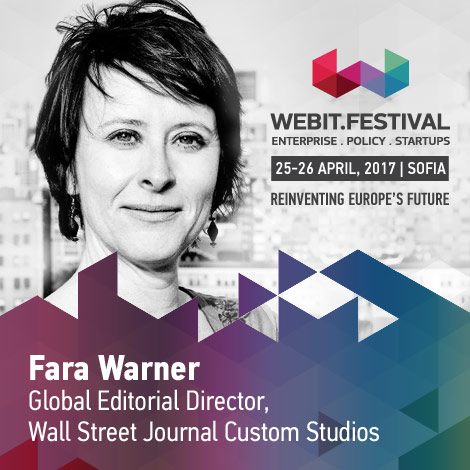 This is the in-house content marketing agency of the media giant, exploring variety of topics. For example, Farah and her team were hired by Netflix to hype the huge successful TV series 'Narcos' with native-ad showpiece. Fara is also a professor of Journalism at the University of Michigan and is the author of the business book "The Power of the Purse: How Smart Companies Are Adapting to the World's Most Important Consumers--Women." As editorial director, she oversees all the aspects of the agency’s editorial from editing freelance work, thinking of new ways for distribution and taking and reporting for the project. In the past she has written pieces for the New York Times, Brandweek, Fast Company and other national publications. She has more than 20 years of experience and is the reciepient of the 2006 diamond Award from Women in Communications for her work illuminating women’s issues in media.
This is the in-house content marketing agency of the media giant, exploring variety of topics. For example, Farah and her team were hired by Netflix to hype the huge successful TV series 'Narcos' with native-ad showpiece. Fara is also a professor of Journalism at the University of Michigan and is the author of the business book "The Power of the Purse: How Smart Companies Are Adapting to the World's Most Important Consumers--Women." As editorial director, she oversees all the aspects of the agency’s editorial from editing freelance work, thinking of new ways for distribution and taking and reporting for the project. In the past she has written pieces for the New York Times, Brandweek, Fast Company and other national publications. She has more than 20 years of experience and is the reciepient of the 2006 diamond Award from Women in Communications for her work illuminating women’s issues in media.
- Chris Clarke, Chief Creative Officer of Digitas Lbi.
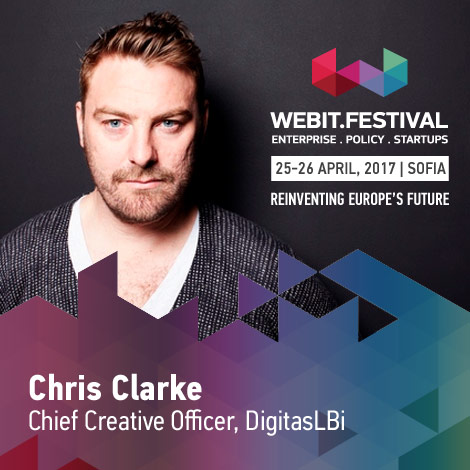 He is responsible for the agency’s creative production worldwide. He is famous for his bold views on number of topics published in worldwide media. Chris is an award-winnig creative with more than 20 years of experience in the digital industry. He has worked with major clients like Sony, Samsung and Coke. Chris is often in list of the most influential creative directors of the year. He has received accolades from Cannes in the Cyber Lions, D&AD, LIAA, Campaign Digital, Campaign Direct, Campaign Big Awards, Revolution, BIMA, Webby and Lovie awards. Chis is regularly asked to speak about digital culture and advertising at events as diverse as Cannes Lions and Bestival. He came to Lbi from Publicis owned Digitas, where he was President and Executive Creative Director of the UK agency following a stint as European Executive Creative Director for Modem Media. Prior to that Chris was Executive Creative Director at Wheel, a company he joined with its acquisition of Swedish hotshop Abel & Baker which he had helped to set up in the UK.
Main topics on the agenda of the summit will be the rising use of virtual and augmented reality, especially in the digital entertainment, how consumer empowerment is driving new brand opportunity, brand social strategies, digital and programmatic advertising, metrix and data, video and mobile video marketing, the future of artificial intelligence in marketing, creating relationships with audience, benefits of storytelling in marketing and many more.
Previous speakers at the Marketing and Innovation Summit are top level executives like Ward Van Duffel, VP and General Manager Direct to Consumer Lego, Benjamin Faes, Managing Director PBS Google, Anosh Thakkar, CTO Philips, Jim Rosenberg, Chief Digital Officer UNICEF, David Moore, Chairman of Xaxis and President of WPP Digital, Jay Altschuler, Director Global Media Unilever, Pete Blackshaw, Global Head of Digital Marketing and Social Media Nestlé, Norm Johnston, Chief Digital Officer Mindshare Worldwide, Dr. Torsten Wingenter, Head of Digital Innovations Lufthansa, Tom Bowman, VP, Strategy&Operations, Global Advertising Sales BBC World.
The Marketing and Innovation Summit is also great for networking – the next business opportunity could be waiting for you right there. Listening to the great presentators, you can also learn a lot about the way you’re a running your business and its marketing.
So, don’t waste your time, these are all the important links you need:
To buy your tickets for Webit.Festival Europe 2017 (EarlyBird expires soon), click here.
To apply for speaking, click here.
To apply for partnership, click here.
To apply for exhibiting, click here.
StartUP? Apply for the Founders Games Challenge by Webit.Foundation and get an opportunity for free festival tickets (500), free exhibition table (100) and opportunity to win 200 000 EUR (only 1), click here.
To see the video gallery from Webit.Festival 2016, click here.
To learn more about the events that are part of the festival, click here.
To see pictures from our previous events, click here.
For more information on the Global Webit Series and our events in Dubai, Singapore, New Delhi and Istanbul: www.Webit.Org.
He is responsible for the agency’s creative production worldwide. He is famous for his bold views on number of topics published in worldwide media. Chris is an award-winnig creative with more than 20 years of experience in the digital industry. He has worked with major clients like Sony, Samsung and Coke. Chris is often in list of the most influential creative directors of the year. He has received accolades from Cannes in the Cyber Lions, D&AD, LIAA, Campaign Digital, Campaign Direct, Campaign Big Awards, Revolution, BIMA, Webby and Lovie awards. Chis is regularly asked to speak about digital culture and advertising at events as diverse as Cannes Lions and Bestival. He came to Lbi from Publicis owned Digitas, where he was President and Executive Creative Director of the UK agency following a stint as European Executive Creative Director for Modem Media. Prior to that Chris was Executive Creative Director at Wheel, a company he joined with its acquisition of Swedish hotshop Abel & Baker which he had helped to set up in the UK.
Main topics on the agenda of the summit will be the rising use of virtual and augmented reality, especially in the digital entertainment, how consumer empowerment is driving new brand opportunity, brand social strategies, digital and programmatic advertising, metrix and data, video and mobile video marketing, the future of artificial intelligence in marketing, creating relationships with audience, benefits of storytelling in marketing and many more.
Previous speakers at the Marketing and Innovation Summit are top level executives like Ward Van Duffel, VP and General Manager Direct to Consumer Lego, Benjamin Faes, Managing Director PBS Google, Anosh Thakkar, CTO Philips, Jim Rosenberg, Chief Digital Officer UNICEF, David Moore, Chairman of Xaxis and President of WPP Digital, Jay Altschuler, Director Global Media Unilever, Pete Blackshaw, Global Head of Digital Marketing and Social Media Nestlé, Norm Johnston, Chief Digital Officer Mindshare Worldwide, Dr. Torsten Wingenter, Head of Digital Innovations Lufthansa, Tom Bowman, VP, Strategy&Operations, Global Advertising Sales BBC World.
The Marketing and Innovation Summit is also great for networking – the next business opportunity could be waiting for you right there. Listening to the great presentators, you can also learn a lot about the way you’re a running your business and its marketing.
So, don’t waste your time, these are all the important links you need:
To buy your tickets for Webit.Festival Europe 2017 (EarlyBird expires soon), click here.
To apply for speaking, click here.
To apply for partnership, click here.
To apply for exhibiting, click here.
StartUP? Apply for the Founders Games Challenge by Webit.Foundation and get an opportunity for free festival tickets (500), free exhibition table (100) and opportunity to win 200 000 EUR (only 1), click here.
To see the video gallery from Webit.Festival 2016, click here.
To learn more about the events that are part of the festival, click here.
To see pictures from our previous events, click here.
For more information on the Global Webit Series and our events in Dubai, Singapore, New Delhi and Istanbul: www.Webit.Org. 